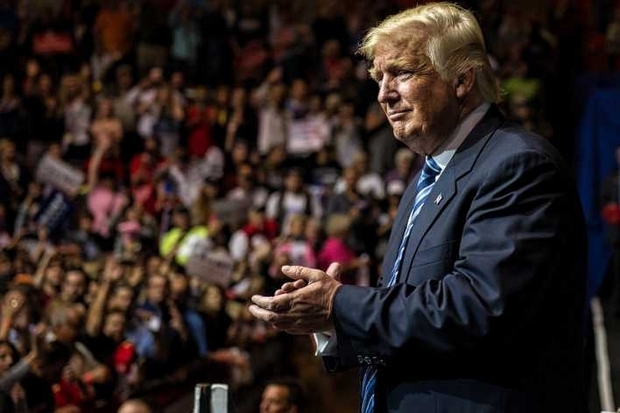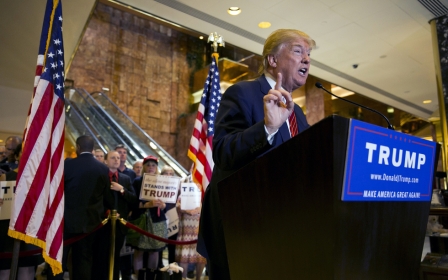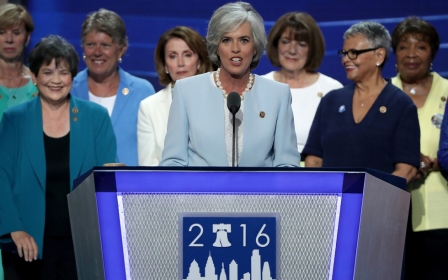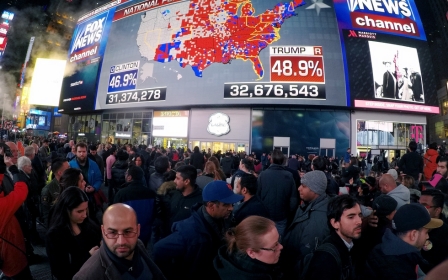Trump steps back from media feud in New York Times meeting

Donald Trump started the day tweeting about the "unfair" news media. He ended it with a polite sit-down with the New York Times where he called the daily a "world jewel".
The turnabout may - or may not - signal a truce in the bitter war between the US president-elect and the press.
Trump unleashed a stream of early morning tweets assailing the "failing" New York daily for continuing to "cover me inaccurately and with a nasty tone!"
After some confusion over whether his meeting with the paper would even take place, the Republican sat down with its journalists for an interview notable for its lack of rancour.
Times reporter Maggie Haberman tweeted that Trump "says he has been treated unfairly during campaign. Says he'd like to improve relationship, that it would make his job easier".
And according to her fellow reporter Julie Davis, the billionaire upon his departure described the daily as "a great great American jewel - world jewel".
The Times' journalists live-tweeted the conversation, which touched on concerns over conflicts of interest involving Trump's business empire, the "alt-right" movement that has cheered his election, and his decision not to push for prosecution of Hillary Clinton.
Notably absent was the vitriol seen in a bruising campaign where the candidate dubbed journalists "thieves and crooks" and was himself labelled a "liar" on the news pages.
Closed vs open
The conversation was in sharp contrast to a day earlier, when the Republican billionaire resumed his onslaught in a closed-door session with high-ranking television executives where, despite expectations of fence-mending, he reportedly gave them a dressing-down over their coverage of the 2016 race.
New Yorker editor David Remnick, citing sources attending the session, said Trump complained that NBC News used unflattering photos showing his double chin, and asked for "nicer" images.
Attendees said they were taken aback at the tone from the president-elect, who repeated claims of insulting and inaccurate coverage.
"I really am offended," one of them was quoted as saying. "This was unprecedented. Outrageous!"
Far from sobered by his heavy new responsibilities as head of state, one participant was quoted as saying Trump "is the same kind of blustering, bluffing blowhard as he was during the campaign".
Trump spokeswoman Kellyanne Conway offered a different version, calling the meeting "cordial" and "productive," adding that "there was no need to mend fences".
Trump-media war
Washington Post media columnist Margaret Sullivan praised the Times for holding Trump to an on-record interview.
"The Times played it right," Sullivan wrote.
"The paper successfully called Trump's bluff. As much as he professes to despise the Times, he remains in some ways the Queens boy who lusted after Manhattan success and acceptance."
But despite the apparent lull, many analysts say they expect the relationship between Trump and the media to remain rocky.
US news organisations dug into a host of Trump controversies as he campaigned for the world's most powerful office.
These included allegations by women that he had harassed or sexually assaulted them, his past failures as a real estate developer and indications that he avoided paying taxes for years.
The Republican pushed back hard - charging the election was being "rigged by corrupt media pushing completely false allegations and outright lies" and colluding to hand victory to Clinton.
'Foil for Trump's message'
Trump's clashes with the media appear to foreshadow a stormy relationship when he moves into the White House in January.
Some groups have already complained Trump has not yet guaranteed "pool" media access, as has been customary, where a small group of journalists accompanies the president-elect on all public events and meetings.
"It's not the media that needs this, it's the public," said Lucy Dalglish, dean of journalism at the University of Maryland.
"He doesn't seem to understand the role that an independent, freely functioning media plays in a democracy. And not to recognise that role is troubling."
Joel Kaplan, associate dean of journalism at Syracuse University, agreed that the media and Trump are in uncharted waters.
"Even those [presidents] who didn't have the best relationship going in understood the role of the press and tried to court individual members," Kaplan said.
Kaplan noted that Trump's hand is helped by a deepening distrust of the news media by the US public, but claimed that should not be a reason to change coverage of the White House.
"The role of the news media is to inform the public," he said. "Once that happens, the public is responsible for what it does with that information."
For Leonard Steinhorn, a communications professor at American University, there is good reason to expect more arm-wrestling between Trump and the news business.
"There's going to be an adversarial relationship because the media serves as a foil for Donald Trump's message," Steinhorn said.
"He will criticise the media if he doesn't like the coverage and it will help him rouse his base."
New MEE newsletter: Jerusalem Dispatch
Sign up to get the latest insights and analysis on Israel-Palestine, alongside Turkey Unpacked and other MEE newsletters
Middle East Eye delivers independent and unrivalled coverage and analysis of the Middle East, North Africa and beyond. To learn more about republishing this content and the associated fees, please fill out this form. More about MEE can be found here.




